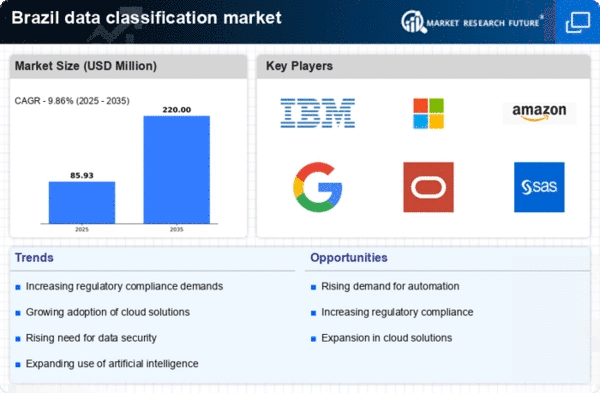Rising Cybersecurity Threats
The escalating frequency and sophistication of cyberattacks in Brazil are propelling the data classification market. Organizations are increasingly recognizing the necessity of classifying data to protect sensitive information from breaches. According to recent statistics, over 60% of Brazilian companies have reported experiencing cyber incidents, which has heightened the urgency for robust data classification strategies. The data classification market is responding to this demand by offering solutions that not only classify data but also provide insights into potential vulnerabilities. As businesses prioritize cybersecurity, the market is expected to expand, with investments in data classification technologies becoming a critical component of overall security strategies.
Growing Data Privacy Concerns
In Brazil, the increasing awareness of data privacy issues is driving the data classification market. With the implementation of the General Data Protection Law (LGPD), organizations are compelled to classify and manage personal data effectively. This regulatory framework mandates that businesses ensure the protection of sensitive information, which has led to a surge in demand for data classification solutions. The market is projected to grow at a CAGR of approximately 20% over the next few years, as companies seek to comply with legal requirements and avoid hefty fines. The data classification market is thus witnessing a significant transformation, as firms invest in technologies that enhance data governance and security.
Digital Transformation Initiatives
Brazilian enterprises are undergoing significant digital transformation, which is influencing the data classification market. As organizations migrate to digital platforms, the need for effective data management becomes paramount. The data classification market is witnessing a shift as companies adopt cloud-based solutions and advanced analytics to streamline operations. This transition is expected to drive the market's growth, with an estimated increase of 15% in demand for data classification tools over the next few years. By classifying data effectively, businesses can enhance operational efficiency and make informed decisions, thereby reinforcing the importance of data classification in the digital age.
Increased Investment in IT Infrastructure
The Brazilian government and private sector are investing heavily in IT infrastructure, which is positively impacting the data classification market. Enhanced infrastructure facilitates the deployment of advanced data classification solutions, enabling organizations to manage their data more effectively. With an estimated investment of $10 billion in IT infrastructure over the next five years, the data classification market is poised for growth. This investment is likely to lead to the adoption of innovative technologies that improve data handling and security. As companies modernize their IT systems, the demand for data classification tools is expected to rise, reflecting the critical role of data management in contemporary business practices.
Emergence of Artificial Intelligence Solutions
The integration of artificial intelligence (AI) into data management processes is transforming the data classification market in Brazil. AI technologies enable organizations to automate the classification of vast amounts of data, improving accuracy and efficiency. As businesses increasingly adopt AI-driven solutions, the data classification market is likely to experience substantial growth. Reports indicate that AI adoption in data management could lead to a 30% reduction in manual classification efforts, allowing companies to allocate resources more effectively. This trend suggests that the future of data classification will be heavily influenced by advancements in AI, making it a pivotal area for investment and development.
















